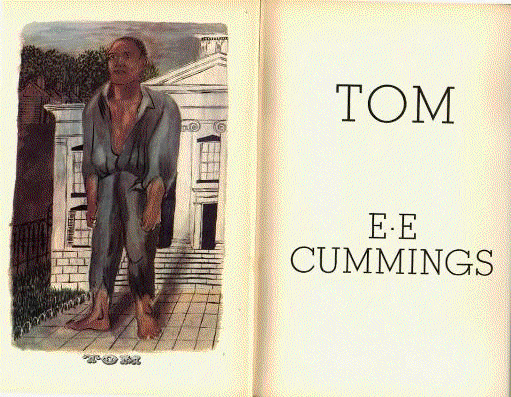In the "News, Notes, Correspondence" section of Spring 11 (2002), we published the dust jacket blurb from the first publication of Tom:
[John T.] Ordeman sent us the following: "Tom, the book Cummings wrote for a ballet based on Uncle Tom's Cabin, which has never been produced, was published in 1935 in an edition of 1500 copies. As the paper of the dust wrapper has become brittle with age, the book is rarely seen with its wrapper. Few people have, therefore, had an opportunity to read the interesting text printed on the inner flap of the wrapper, a text which, if not written by Cummings, was certainly used with his knowledge and approval. This is that text":
TOM
By E. E. Cummings
This latest work of Cummings will be welcomed, by admirers of The Enormous
Room, as a transcendental commentary on Jean le Nègre. Whoever
is irritated by poetry will be irritated anew. Anyone who reads HIM
will appreciate this second (and equally original) contribution to theater;
anyone who saw the play will eagerly await this ballet’s production. The
starting point of EIMI immediately suggests Tom: in each case,
a humanitarian idée fixe serves as the springboard for
a plunge into actuality. Here, again, a poet speaks; here again, a partial
and cowardly epoch is fearlessly and completely challenged. Vividly (as
the spectacle of man's imperfection becomes the drama of man's salvation
through imperfection) we are reminded of two lines from No Thanks—By E. E. Cummings
"this mind made war
being generous"
being generous"
